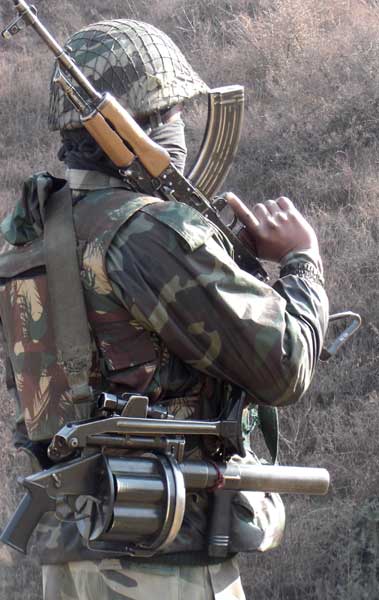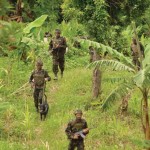Playing a ‘soldier’ has always been a very enticing engagement amongst children. Even grown-ups of prominent status like the tag of being a ‘military- man’, as evidenced by their urge to be conferred with honourary or colloquial ranks, secure membership of military clubs, donning military outfits or getting photographed with soldiers. Indeed, these are but harmless manifestations of a latent instinct for adventure and bravado amongst the well-meaning. In fact, they go to uphold the glamour of military service. Soldiers appreciate that. Of late, however, understanding of the ‘soldiery’ seems to have been somewhat warped by misplaced enthusiasm.
“The significant characteristics of the relationship between the armed forces and society is ‘difference’, not comparability” —Huntington.
Whither Soldiers?
Playing a ‘soldier’ has always been a very enticing engagement amongst children. Even grown-ups of prominent status like the tag of being a ‘military- man’, as evidenced by their urge to be conferred with honorary or colloquial ranks, secure membership of military clubs, donning military outfits or getting photographed with soldiers. Indeed, these are but harmless manifestations of a latent instinct for adventure and bravado amongst the well-meaning.
A better understanding of military ethos would allow the State to rescue itself from the disgrace of watching its soldiers returning their war-medals…
In fact, they go to uphold the glamour of military service. Soldiers appreciate that. Of late, however, understanding of the ‘soldiery’ seems to have been somewhat warped by misplaced enthusiasm. It is proposed to discuss the misinformed tendency of trivialising the ‘call’ of soldiering which has serious connotations.
Pretentious Tendencies
Certain prominent news magazines have recently published articles on counter-Naxal operations, in which the difficulties faced by the police forces – CRPF, BSF and the State Armed Police – have been very aptly articulated. In these articles, the authors have chosen to describe the policemen as “soldiers”. In similar vein, one often reads about the politicians proclaiming themselves as loyal “soldiers” of their political parties despite their penchant for shifting loyalties. Notwithstanding their professional acumen these enthusiasts are obviously misinformed of the sanctity of a soldier’s ‘calling’. However, before proceeding to delve further into these misconstrued pronouncements, it must be clarified that policemen and politicians are equally responsible servants of the state and deserve to be accorded the appreciation due. But of course, soldiers they cannot be and need not pretend to be.
Generally, such innocent pretentions are allowed to pass. But when viewed in light of the recently manifested developments of the undesired kind wherein the media hypes instances of perceived ‘military misconduct’ with half-facts, and policy makers expose their insensitivity towards their soldier’s concerns it may be the time to set the record straight. Maybe a better understanding of soldiery would save the media from unintended dissemination of misinformation for the good of its credibility. Maybe a better understanding of military ethos would allow the State to rescue itself from the disgrace of watching its soldiers returning their war-medals or being chastised by courts of law for gross insensitivity towards its obligation in upholding the dignity of the military institution, its all-weather saviour.
A better understanding of soldiery would save the media from unintended dissemination of misinformation for the good of its credibility…
Most of all, it might shame military officers and men to save themselves from diluting the honourable status of the military institution and stay clear of such indiscretions to which some amongst them might be tempted to indulge in.
Let us see as to why it is necessary to have a distinct view of the military institution and the nation’s soldiery.
Constitutional Definition
The Constitution of India provides for distribution of powers between the Union and the States through lists of subjects dealt with by each in the form of Union List (List I), State List (List-II) and Concurrent List (List–III), as specified in its VIIth Schedule. The Union List (List I), Item 2, envisages two terms, namely, “Naval, Military and Air Force” and “any other Armed Forces of the Union”. The term “Naval, Military & Air Force” connotes the “Defence Forces” whereas the expression “Other Armed Forces of the Union” covers other forces such as Central Reserve Police Force, Border Security Force and Indo-Tibetan Border Police, which are sometimes referred to, mistakenly as Para-Military Forces, and recently classified under the formal term of Central Armed Police Forces (CAPF).
The Term “Armed Forces”
Army Act, 1950, does not define the term “Armed Forces” per se but it defines the term “Forces” vide Sec 3 (xi) thereof, which inter-alia means, “the Regular Army, Navy & Air Force or any part of any one or more of them”. Further, Article 53 (2) of the Constitution envisages that the supreme command of the ‘Defence Forces of the Union’ shall be vested in the Rashtrapati. This, inter-alia, means that supreme command of the Army, Navy and the Air Force devolves upon the Rashtrapati, which is not the case with “Other Armed Forces of the Union”, the Para-Military Forces or the CAPF. Indeed, the practice of colloquial usage of the term “armed forces” to refer to the three services – the Army, Navy and Air Force – may be the reason for the laymen mixing up these forces with the ‘Other Armed Forces of the Union’.
The Term “Other Armed Forces of the Union”
The Army, Navy and the Air Force after the advent of air power have been institutions of the State since time immemorial. Other than these, the state has raised certain other armed forces from time to time under various Acts.
The Defence Forces are the ultimate instrument of the State to preserve its integrity…
The term “Other Armed Forces of the Union” covers these forces, as listed below:-
- The Central Reserve Police Force (CRPF) by the Act of 1949.
- The Indo-Tibetan Border Police (ITBP) by the Act of 1962.
- The Railway Protection Force (RPF) by the Act of 1957.
- The Border Security Forces (BSF) by the Act of 1965.
- The Central Industrial Security Force (CISF) by the Act of 1983.
- The Nation Security Guard (NSG) by the Act of 1986.
The Term “Para-Military Forces”
The term ‘Para-Military’ is defined as, “having a military structure although not officially military capable of supplementing a military force of a country”. There is however no statutory categorisation of this term though the Assam Rifles qualifies for this category. Further, Rule 2 (d) of the Ex-Servicemen Re-Employment Rules, 1979, uses this term to refer to the Assam Rifles, CRPF, BSF, ITBP, CISF, Shashatra Seema Bal (SSB) and the RPF. The Indian Coast Guard (ICG) and NSG, raised subsequently, are not formally defined as Para-Military Forces neither do they form part of the ‘Defence Forces’. Therefore, they fall under the category of ‘Other Armed Forces of the Union’, on the authority of the ICG and NSG Acts. May be some day the term ‘Para-Military Forces’ will be formally defined when the ICG and NSG are included in its ambit.
The distinction between defence, police and para-military forces thus established, let us now see as to what it means to be a ‘soldier’.
Different Mandates
The ‘Defence Forces’ and the ‘Other Armed Forces of the Union’ are mandated distinctly which reflects in terms of entry criteria, service conditions, deployability, commitments and liabilities. ‘Defence Forces’ (Army, Navy and Air Force) are maintained by the Central Government through the Ministry of Defence to protect the nation from external aggression and catastrophic calamities. The latter role is assigned to gain advantage of the ability of the services to function efficiently under adverse conditions. It may also be tasked to preserve the nation’s integrity against any internal insurrection that may have gone beyond the control of the civil administration.
There is an edge granted to the personnel of ‘Defence Forces’ over those employed with the ‘Other Armed Forces of the Union’…
The primary task of the ‘Defence Forces’ is therefore to fight against the enemies of the state, internal or external. The ‘Other Armed Forces of the Union’, commonly grouped under the nomenclature of CAPF, have been raised by the Central Government through the Ministry of Home Affairs to maintain law and order and preserve societal peace when the scale of lawlessness goes beyond the State Government’s capabilities. The mandate of the CAPF is, therefore, to assist in smooth governance and civil administration.
The Covenant of the State-Soldier Relationship
The Defence Forces are the ultimate instrument of the State to preserve its integrity through application of constitutionally sanctioned violent force when all other civilised options fail to work. Obviously, the Defence Forces cannot fail else the State would collapse. In order to stand up to such an extraordinary mandate, soldiers have to pledge their life, limb and comforts to the service of the nation and give up many of the democratic rights that are enjoyed by the rest of the citizenry. In return, under the pristine ‘covenant’ between the soldier and the state, the latter accords to the former, certain statutory service privileges. Some of these are as follows:-
- Immunity from attachment by any civil or revenue court (Army Act, Section 28).
- Immunity from arrest for debt by any civil or revenue court (Army Act, Section 29).
- Immunity of persons attending court martial from arrest under any civil or revenue process (Army Act, Section 30).
- Priority in respect of army personnel litigation (Army Act, Section 32 and Indian Soldier Litigation Act, 1925).
- Protection of rights and privileges under other laws, such as the Indian Tolls (Army and Air Force) Act, 1901 and Pensions Act, 1987.
- Statutory provision for allotment of state land, exemption from municipal taxes, reservation in jobs and educational institutions and so on.
Besides such statutory provisions, the state also fulfils its part of the covenant by way of various measures undertaken for welfare, domestic support, bestowal of honour, show of respect and sundry benefits. These service privileges and immunities are exclusive to the burden of soldiering and are not available to ‘Other Armed Forces of the Union’ under any Act. However, since the terms, “Armed Forces” and “Other Armed Forces of the Union” appear to be similar, state functionaries while extending compensatory rewards and benefits to the Defence Forces personnel, do sometimes tend to mix up these two distinct terms without actually intending to do so.






Touche. Solid arguments. Keep up the great spirit.
Also visit my web-site: bumper warranty lasts